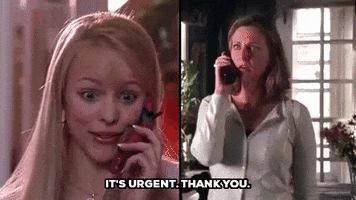11:59 PM - The most dreaded time stamp for the entire student community. You'd never see a more focused and determined human being than an undergraduate at 11:59 PM 🕛 who has an assignment due the next day. We've all been there. The adrenaline, the rush, the gripping uncertainty of making it to the finish line. Did we just define youth?
Probably. But we also defined a scenario that, when imagined in the real world, would leave you highly uncomfortable. Because let's face it. None of us would want our managers or seniors to question our professional credibility just because we couldn't complete our work in due time. Yet, most of us still find ourselves in such situations more times than we'd like to admit.
Whenever we're given a deadline to finish a task, our instinct is to evaluate whether we have ample time on our hands. If the answer is no, well then, suck it up buttercup , coz you gots to get to work. However, if by God's grace, the answer comes out to be yes, our go-to move is to devise a rudimentary plan and relax. Relax until we get to a phase where we don't have any time to relax. Basically, we end up procrastinating.
But what if we did not have any deadline? Would it be easier for us to handle the given task in a more effective manner? Do deadlines encourage or maybe even trigger our unconscious minds to procrastinate? Let's talk about it.
What is the deal with deadlines and procrastination?
Well, the deal is actually a bit more complex than it appears. And we'd get nothing by just scratching the surface. Before we announce a verdict on how closely the two are linked, we need to look at several factors about the human psyche and the nature of deadlines. Specifically speaking, the duration and flexibility in deadlines.
More time, more commitment, more work
We humans have a weird craving for perfection. Even though absolute perfection is just a mythical concept, we wish to attain it whenever we engage in an activity. And the more time we have in hand, the more perfection we seek.
At times, that comes at the cost of optimisation. When you have longer deadlines, you tend to think that an assignment is more complex than it is, which motivates you to commit more resources to the work. You put in more effort, try to enhance all the nuances and build an elaborate plan to tackle the task. Maybe a bit more elaborate than what's needed. This, in turn, increases how much you may procrastinate and, eventually, the likelihood of you quitting the project altogether.
In a study where two factions of participants were asked to file their tax returns on different deadlines, people with a tighter schedule completed it in a precise manner without spending many resources. On the contrary, people with longer deadlines proceeded to dedicate a lot of their time to file their taxes and even spent greater money on hiring tax professionals or buying taxing software.
This conforms to the notion that with longer deadlines, the perception switches. You see a larger-than-real problem in front of you and try to tackle it to the best of your abilities. However, this increased commitment and difficulty are synonymous with stress. This is why people will be more drawn to procrastinate here. Yeah, we know, the human brain is funny.
Urgency over importance
Imagine that you've recently set up your own business. Congratulations, by the way. You did the market research, you tried to remain consistent and eventually, you were able to get a recurring set of customers by adopting a schedule. Following this routine is continuously getting you steady business but at a stagnated pace. Being the brilliant entrepreneur you are, you figure out that a dedicated marketing campaign is what your business needs to make it grow. Now, you can either tweak the current routine, make it more complex, integrate this marketing plan into it and grow your business, or you can continue with your schedule and make decent but saturated income.
There's an obvious choice to this dilemma, right? Well, not exactly. On paper, everyone would gun for adopting a marketing plan. However, in reality, most people take the second route, i.e. they'll choose the low payoff option if it guarantees immediate and satisfactory rewards. You'll continuously send the marketing plan to the end of the pipeline while prioritising your current routine.
This is because of the common belief that important tasks are more difficult and further away from goal completion, while urgent tasks give you immediate and certain payoffs. These urgent tasks are often trivial, especially if compared to the important tasks. Yet, we prioritise them more often than not, consciously delaying high-payoff and more important tasks in the process. This phenomenon is known as the mere urgency effect.
Quick success gives you a momentary sense of achievement - a temporary high - which looks more appealing to the human brain than long-drawn processes with higher but non-guaranteed rewards. That is precisely why you'd rather check your emails than focus on the long-term project you've been dreaming about. You'd think that you're being productive by clearing your inbox. In truth, you're unconsciously procrastinating on your dream project, dear friend.
Self-imposed deadlines, what a farce!
We are all aware of the level of self-control we have. And most of the time, we try to better ourselves by curbing the time we spend procrastinating. We do want the best for ourselves, after all. Or that's what we think.
While the idea is super noble, its execution is not that simple. People do self-impose costly deadlines to overcome procrastination and at times, they are effective in enhancing their task performances. However, they hardly set these deadlines in the most optimal way possible. Let's refer to this study conducted by Dan Ariely of MIT, to understand this concept better. In an experiment, two sets of students were asked to turn in research papers. While the first set of students was given specific deadlines, the second set of students had the option to hand in their papers at their whims. Papers were only graded at the end of the term to keep the proceedings fair for both sets.
Surprisingly, the majority of students in the second group set their submission dates a few good days before the semester-end. We can see that they knew that setting a longer deadline would cause them to delay work and procrastinate more. So the intent was clearly there. However, when the results were calculated, students with specific deadlines faired much better than the second lot.
So what happened? The second set clearly wanted to do their best work. If they wanted, they could have submitted their papers on the very last day. But they didn't. And yet, they came in second place. The reason behind this anomaly lies in the execution and not motivation. There are two major factors behind the failure of the lot.
Number one is the fact that self-imposed deadlines carry a lot less authority than deadlines given by someone else. They are inherently a lot less binding than their counterparts. You can dedicate a lot more resources, a lot more effort - you can convince yourself to keep moving forward in times when you'd usually lay low - when you're shouldering someone else's expectations. You'd do your best not to fail them and lose your credibility in the process. On the other hand, it is much more fathomable to compromise with your own expectations. This is precisely why self-imposed deadlines are not given the seriousness their tasks deserve.
Number two is the difference between thinking and doing. No matter how perfect of a plan you come up with, you're bound to fall short on certain steps. The group with allotted deadlines, for instance, were handed some constraints upon which they had to devise a strategy, leaving minimal room for error. On the contrary, the second group had all the cards in their hands. They made the rules, set the target and composed a plan accordingly. However, this amount of flexibility can seamlessly become a bane rather than a boon for people with self-control problems (basically, most of us). Because if you're calling all the shots, you have to be absolutely sure that you're doing everything optimally. And we all know complete perfection is just a concept.
This goes on to show why self-imposed deadlines sound ideal in theory but can produce underwhelming outputs in reality.
So what should you do?
Considering all the facts that have been presented, we can say that the nature of deadlines has to do a lot with the degree of procrastination you indulge in. If a higher authority has given you one, that too of a very short nature - you'd be super effective. On the contrary, if it's your own project and the deadline you set for yourself to complete is pretty far - well amigo - there's a high chance that this project may remain unfinished forever.
Additionally, unless you are supremely organized and cognizant of all the consequences that may ensue if you don't follow your routine, setting self-imposed deadlines may not be your best bet. Take a page from Varun Khadri's book, whose not a productivity expert but maintains discipline by being aware of his limitations and the consequences of not performing actions
.Planning is a crucial skill that can help you break out of this deadline-procrastination loop. If the high-payoff reward is worth it, make a conscious effort to ditch the urgent tasks that are keeping you from the long process that awaits you. The last thing you'd want to do is use it as an excuse for not achieving your goals, right? At the end of the day, you may not get to choose the nature of the deadline you have to deal with it. But if you make it irrelevant to your work ethic, it'll be just another problem for the world - not for you.
Hope you liked our take on the relationship between deadlines and procrastination. If you're still struggling with procrastination, you may want to check out some handy methods that world leaders of current, including Elon Musk and Jack Dorsey, are using on a daily basis. Yepp, we've composed a blog on that too. Here you go -
Till next time, stay safe, stay productive and just stay! ❤️












